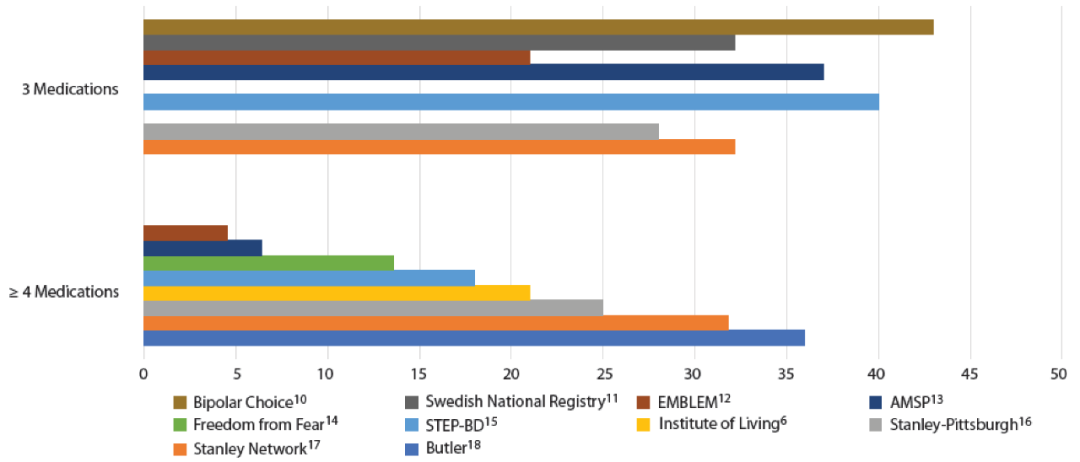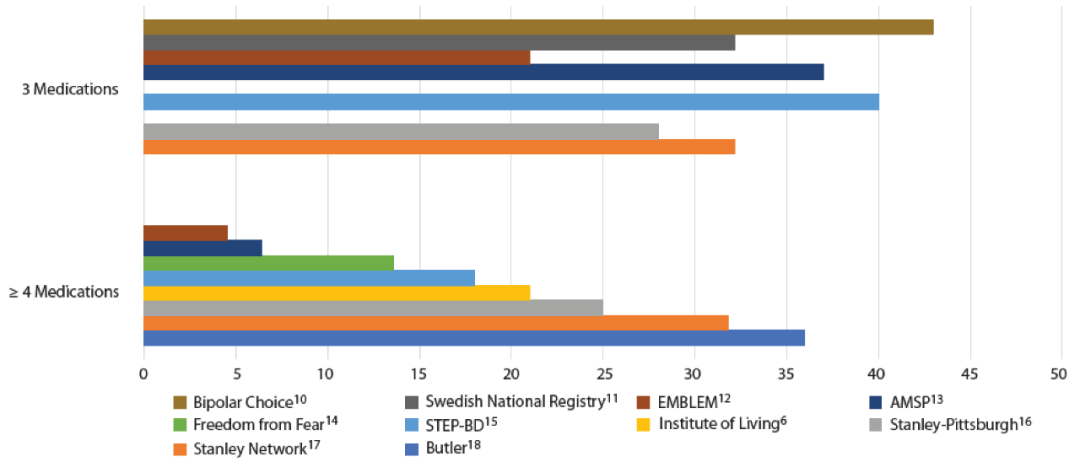Complex Combinations for Bipolar Disorder: Eight Recommendations | Expert Perspective
- Categories:News
- Author:
- Origin:
- Time of issue:2021-06-07
- Views:0
(Summary description)The course and clinical aspects of bipolar disorder are complicated, and it is quite common for patients to use three, four or more psychotropic drugs in combination. The problem is that natural observational studies have shown that multi-drug combination may not lead to better outcomes, which gradually arouses concern.
Complex Combinations for Bipolar Disorder: Eight Recommendations | Expert Perspective
(Summary description)The course and clinical aspects of bipolar disorder are complicated, and it is quite common for patients to use three, four or more psychotropic drugs in combination. The problem is that natural observational studies have shown that multi-drug combination may not lead to better outcomes, which gradually arouses concern.
- Categories:News
- Author:
- Origin:
- Time of issue:2021-06-07
- Views:0
The course and clinical aspects of bipolar disorder are complicated, and it is quite common for patients to use three, four or more psychotropic drugs in combination. The problem is that natural observational studies have shown that multi-drug combination may not lead to better outcomes, which gradually arouses concern.
Research Introduction
In this context, Anna M. Kim, Department of Psychiatry, Northwell Health System, New York, USA, and other systems searched MEDLINE, PsycINFO and Embase databases for related observational and randomized controlled studies, aiming to evaluate the complex combination of drugs in patients with bipolar disorder (combined use ≥3 kinds of psychotropic drugs), clinical characteristics, compliance, etc., and provide operable guidance for clinical practice. The study was published online on June 1 in J Clin Psychiatry.
Researchers selected 49 studies that met the inclusion criteria from 3,566 titles. Weighted analysis showed that 32.7% (4,535/13,863) of patients with bipolar disorder had complex combination medications, that is, using ≥3 psychotropic drugs at the same time, and the proportion of patients with bipolar depression was the highest. In the past two decades, the use of complex combination drugs has shown an increasing trend.

Figure 1 The proportion of patients with bipolar disorder who used three (top) or ≥4 (bottom) psychotropic drugs in each study (Kim AM, et al. 2021)
Factors associated with complex combination medications in patients with bipolar disorder include female, white, age >50 years old, history of psychotic symptoms, heavy burden of depression-related diseases, insufficient medication, poor treatment compliance, more psychiatric comorbidities, and suicide The history of attempt is more prominent.
Clinical advice
Focusing on the complex combination of bipolar disorder, the researchers gave eight tentative suggestions:
1. Familiar with the relative strengths of different drugs in the treatment of mood stabilization, such as lithium salt and divalproex sodium are better at anti-mania, lamotrigine is better at anti-depression, and use this to construct a multiple combination drug regimen, rather than simple Pile up drugs on the ground.
2. Depending on the situation, try to use more comprehensive drugs to simplify the medication regimen. For example, quetiapine, lurasidone, cariprazine can simultaneously improve depression and anxiety; gabapentin can simultaneously improve anxiety, insomnia and neuralgia.
3. Before adding the same class of drugs (for example, adding another SGA to the existing SGA), optimize the dosage of the existing drugs.
4. Change only one variable in the combination regimen group at a time (for example, only one drug at a time) in order to clarify the effect of drug adjustment on the outcome of treatment and reduce confusion.
5. Before the effect of a sufficient course of treatment can be reasonably judged, try not to stop suddenly and start drugs suddenly.
6. Regularly weigh the risks and benefits of the existing components in the complex combination regimen, such as whether it has done more harm than good.
7. Decisively stop drugs that are considered to be ineffective (eg, a sufficient course of treatment is ineffective), and improper use of drugs (eg, antidepressants or neurostimulants used during manic or mixed episodes).
8. Regularly evaluate the significance of each component in the multi-drug combination program.
Literature Index:
Kim AM, Salstein L, Goldberg JF. A systematic review of complex polypharmacy in bipolar disorder: prevalence, clinical features, adherence, and preliminary recommendations for practitioners. J Clin Psychiatry. 2021;82(3):20r13263.
Scan the QR code to read on your phone
Jiangsu Healsun Meical Co., Ltd.
Tel:025-86669187
e-mail:Office@Healsun.com
Address:Room 1616, Building F1, Intercity Space Station, No. 12 Jinlan Road, Jiangning District, Nanjing, China
WeChat public account
Jiangsu Healsun Meical Co., Ltd. 苏ICP备19029369号-3





